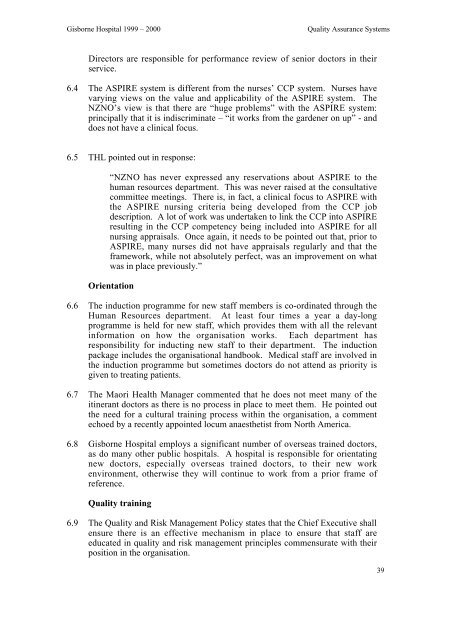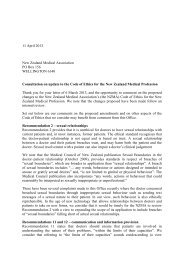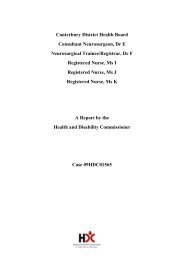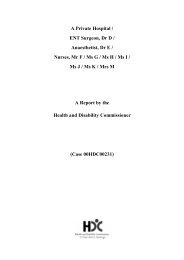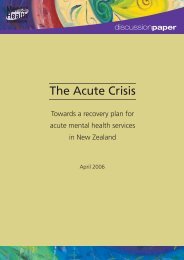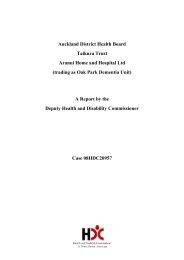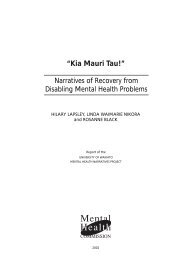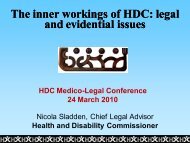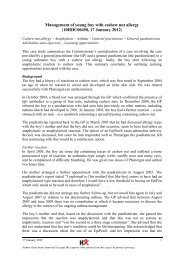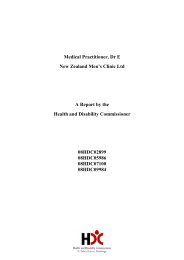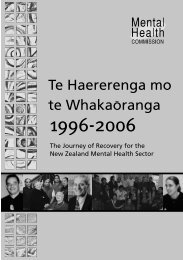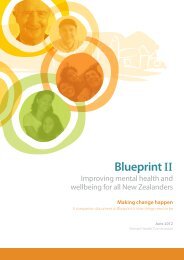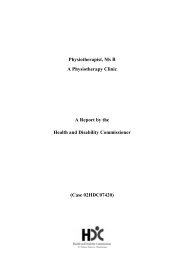Gisborne Hospital Report - Health and Disability Commissioner
Gisborne Hospital Report - Health and Disability Commissioner
Gisborne Hospital Report - Health and Disability Commissioner
You also want an ePaper? Increase the reach of your titles
YUMPU automatically turns print PDFs into web optimized ePapers that Google loves.
<strong>Gisborne</strong> <strong>Hospital</strong> 1999 – 2000<br />
Quality Assurance Systems<br />
Directors are responsible for performance review of senior doctors in their<br />
service.<br />
6.4 The ASPIRE system is different from the nurses’ CCP system. Nurses have<br />
varying views on the value <strong>and</strong> applicability of the ASPIRE system. The<br />
NZNO’s view is that there are “huge problems” with the ASPIRE system:<br />
principally that it is indiscriminate – “it works from the gardener on up” - <strong>and</strong><br />
does not have a clinical focus.<br />
6.5 THL pointed out in response:<br />
“NZNO has never expressed any reservations about ASPIRE to the<br />
human resources department. This was never raised at the consultative<br />
committee meetings. There is, in fact, a clinical focus to ASPIRE with<br />
the ASPIRE nursing criteria being developed from the CCP job<br />
description. A lot of work was undertaken to link the CCP into ASPIRE<br />
resulting in the CCP competency being included into ASPIRE for all<br />
nursing appraisals. Once again, it needs to be pointed out that, prior to<br />
ASPIRE, many nurses did not have appraisals regularly <strong>and</strong> that the<br />
framework, while not absolutely perfect, was an improvement on what<br />
was in place previously.”<br />
Orientation<br />
6.6 The induction programme for new staff members is co-ordinated through the<br />
Human Resources department. At least four times a year a day-long<br />
programme is held for new staff, which provides them with all the relevant<br />
information on how the organisation works. Each department has<br />
responsibility for inducting new staff to their department. The induction<br />
package includes the organisational h<strong>and</strong>book. Medical staff are involved in<br />
the induction programme but sometimes doctors do not attend as priority is<br />
given to treating patients.<br />
6.7 The Maori <strong>Health</strong> Manager commented that he does not meet many of the<br />
itinerant doctors as there is no process in place to meet them. He pointed out<br />
the need for a cultural training process within the organisation, a comment<br />
echoed by a recently appointed locum anaesthetist from North America.<br />
6.8 <strong>Gisborne</strong> <strong>Hospital</strong> employs a significant number of overseas trained doctors,<br />
as do many other public hospitals. A hospital is responsible for orientating<br />
new doctors, especially overseas trained doctors, to their new work<br />
environment, otherwise they will continue to work from a prior frame of<br />
reference.<br />
Quality training<br />
6.9 The Quality <strong>and</strong> Risk Management Policy states that the Chief Executive shall<br />
ensure there is an effective mechanism in place to ensure that staff are<br />
educated in quality <strong>and</strong> risk management principles commensurate with their<br />
position in the organisation.<br />
39


